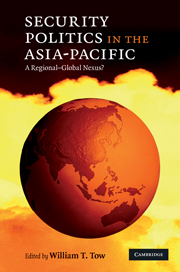Preface
Published online by Cambridge University Press: 05 June 2012
Summary
As the Cold War recedes further into history, organising security has become manifestly more challenging. Recent international security debates have underscored how even the concept of ‘security’ is vigorously contested. The traditional preoccupations with state-centric survival and positionality are becoming increasingly supplanted by concerns that transcend sovereign borders and that focus on individuals and intra-state factions. The geopolitics of power-balancing and great power primacy is now coexisting with such dynamics as humanitarian politics, democratisation, climate change and pandemic controls to shape a new and broader set of security referents.
This paradigmatic evolution has been assessed extensively, and what role the Asia-Pacific region has played in this process has been an important component of the discussion. In recent years, important and highly respected works have appeared to assess this issue. Analysts have continued to disagree, however, over what is most causally important in determining and understanding the increasingly critical link between what happens in that region and how global security politics is ultimately shaped and implemented. It may be that providing a truly comprehensive definition is beyond the reach of any single study. Yet the effort to capture and explain its significance is decidedly relevant as Asia ascends to economic primacy, as it increasingly counts for more within the world's diplomatic channels and as it becomes a central factor in its military balance.
- Type
- Chapter
- Information
- Security Politics in the Asia-PacificA Regional-Global Nexus?, pp. x - xiPublisher: Cambridge University PressPrint publication year: 2009

